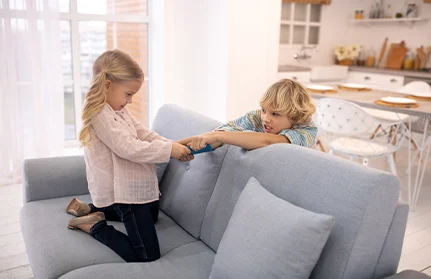Being sent home with notes from school, calls with teachers, and guidance counselors about their behavior, and disruptive behavior with friends and at home. Whether your child has been diagnosed, or you’re just starting to suspect that your child has Conduct Disorder, the news can be unsettling and cause a lot of uncertainty about the future.
It’s common for parents and loved ones to feel a sense of relief that they have an explanation for their child’s behaviors, but are left without guidance on how to move forward. At Ally Psych, our trained therapists are here not just to help your child but guide your family too.

You witnessed or have been told that your child is aggressive towards others. This can look like bullying peers or being cruel to animals too.

Your child deliberately engages in fire setting to cause damage or intentionally seeks to destroy others’ property

This can include breaking into someone’s property, lying or conning others, or shoplifting.

Your child often defies rules, like staying out past curfew. They may also run away from home or are truant from school.
We understand that Conduct Disorder can feel exhausting and scary. You’ve probably already tried things to help your child too, but if they haven’t been effective, it might be time for professional help. The therapists at Ally Psych will guide you and your family through realistic solutions to help. We’ll also work directly with your child to help them learn coping skills and better ways to express themselves.
Both ODD and Conduct Disorder are types of childhood disruptive behavior disorders. Both are characterized by children acting out against other children or adults through defiant and disrespectful behavior. ODD includes an overall negative or agitated mood, a quarrelsome attitude, or being vengeful for at least six months. The onset of ODD is before eight and not after 12 years of age. Conduct disorder is a continual pattern of aggression toward others and intentional rule-breaking behavior. Conduct Disorder is a condition where a child intentionally violates rules and the rights of others. The age of onset is 11 years old, but it can still develop in early adolescence.
No. This diagnosis does not mean they will have a bad future. While this is a common concern for the parents of children with Conduct Disorder, it’s important to know that with the right therapy, your child will grow out of these behaviors and be able to lead an exceptional life
It is common for parents to be afraid of their child with Conduct Disorder. However, just because it is common does not mean it is okay or normal. If you’re ever worried about your safety, or the safety of others, you should contact the police immediately.
The majority of children, about 70%, who display Conduct Disorder symptoms will grow out of it by adolescence.
Parents are often triggered by their children with Conduct Disorder as their behavior can induce fear and danger for their child, family, and others. Parents need to talk with a therapist and develop a plan to respond consciously and not react to their children’s behavior. Parents remaining calm and having a detailed plan of how to act with each disruptive behavior when it occurs can make a difference in how these episodes are handled.
Parents with children with Conduct Disorder often feel that other parents move their children away from children with Conduct Disorder. They may not be invited to playdates and may be excluded from parties. When your child is excluded from their friend group, you may also be excluded from the parent group. This can feel lonely and isolating. It is also painful to watch your child be excluded. Finding the right therapist(s) to work with your family on your child’s behavior can help reduce symptoms over time that push other children and families away.
When you’re ready to talk, we’re ready to listen. Fill out the form below to get in touch with Ally Psych and schedule your appointment.